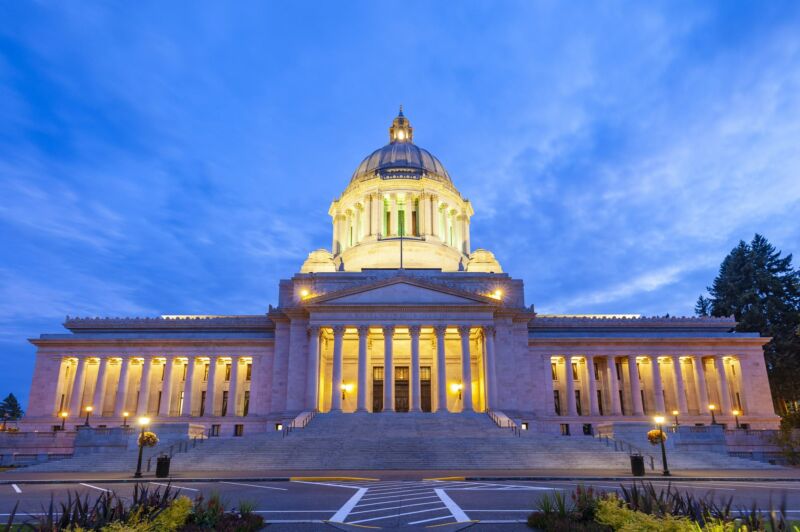Progress for public networks —
Proposed law allowing public broadband networks awaits governor’s signature.
Jon Brodkin
–

Enlarge / State Capitol building in Olympia, Washington.
The Washington state legislature has voted to end limits on municipal broadband, and the bill lifting those restrictions now awaits the signature of Democratic Gov. Jay Inslee. The state Senate passed the bill Sunday in a 27-22 vote, and the state House passed it on February 23 by a vote of 60-37.
“This bill reverses decades of bad policy—Washington was one of only 18 states with a STATE LAW prohibiting some local governments from offering broadband directly to the public,” Democratic Rep. Drew Hansen, the bill’s lead sponsor, wrote on Twitter. “Long overdue. Thanks to the BIPARTISAN group of Senators who stood up for public broadband today!!”
The Senate vote went mostly along party lines, but one Republican (Brad Hawkins) voted yea and three Democrats (Steve Hobbs, Mark Mullet, and Lisa Wellman) voted nay.
BREAKING: Wash. Senate just passed my Public Broadband Act (HB1336).
🔥🔥🔥
Thanks to the parents, teachers, students, public utility districts, tribes, activists, 1000+ people signing in support (!) and more. WE did this; amazing team effort.
Public Broadband Now!!!
— Rep. Drew Hansen (@RepDrewHansen) April 12, 2021
There’s still one complication. A second bill sponsored by Sen. Wellman that “would do much less to eliminate barriers to municipal broadband solutions” passed the House on Sunday and had previously passed the Senate, said an article on the Institute for Local Self-Reliance’s Community Broadband Networks website. “The two competing bills have been sent to the state governor and it is expected one will be vetoed,” the article said.
Details on competing bills
A 21-year-old Washington state law (54.16.330) “authorizes some municipalities to provide communications services but prohibits public utility districts from providing communications services directly to customers,” as noted in attorney Jim Baller’s list of states that restrict municipal broadband or other public communications initiatives. (Baller runs a telecommunications law firm that represents local governments.)
The Hansen-sponsored bill now awaiting the governor’s approval specifically authorizes public utility districts, port districts, counties, and towns to provide retail telecommunications service to end users. Additionally, the bill lets public utility districts and port districts offer service both inside and outside their district’s geographic limits.
The bill also deletes a line from 54.16.330 that says, “[N]othing in this section shall be construed to authorize public utility districts to provide telecommunications services to end users.” The bill changes another state law by deleting the line “nothing in this subsection shall be construed to authorize port districts to provide telecommunications services to end users.”
By contrast, the other bill that the governor has the option of signing prohibits public networks in areas defined as served. The Community Broadband Networks article explained:
S.B. 5383 originally included a preemption clause that gave private Internet Service Providers (ISPs) the power to veto proposed public projects in areas they plan to expand service within the six months. The clause was later amended to remove the veto authority, but in its place a new provision favoring incumbent ISPs was added. The added amendment prohibits PUDs (public utility districts) and ports from providing retail Internet services in areas where an existing provider offers service at a minimum speed threshold of 100/20 Megabits per second (Mbps), meaning any region served by a cable provider is unlikely to become serviceable by a PUD or port. It is not clear what measurements would be used to decide whether 100/20 is available in a given area.
The Wellman bill specifically says that municipal providers can only offer retail telecom service in unserved areas.
The final version of the Hansen bill requires municipalities to provide “evidence relating to the unserved nature of the community” before offering broadband, but Hansen said that it does not prohibit municipal networks in those unserved areas. Hansen told Ars that “it’s just a reporting requirement” and that public entities “can still serve the areas that already have service.” The reporting “lets the State Broadband Office know who literally has nothing, which can help the broadband office allocate grants,” he said.
Hansen was also the lead sponsor of Washington’s net neutrality law.
Chipping away at municipal broadband limits
Washington is one of 19 states on Baller’s list of states that restrict municipal networks. Arkansas is another of those 19 states, but its Republican-dominated legislature in February gave local governments new authority to provide broadband access.
Municipal broadband can solve access and affordability problems in areas where private ISPs haven’t upgraded networks to modern speeds, fail to provide service to all residents, and/or charge outrageous rates. Though the Arkansas vote shows that Republicans aren’t universally opposed to municipal broadband, the GOP in general has been fighting public networks for years in order to protect private ISPs from competition. Congressional Republicans in February proposed a nationwide ban on municipal broadband networks.
Democrats in Congress proposed overturning state laws that prevent the growth of municipal broadband, and President Joe Biden has a stated goal of “lifting barriers that prevent municipally owned or affiliated providers and rural electric co-ops from competing on an even playing field with private providers.” Biden’s plan would also spend $100 billion to upgrade broadband while prioritizing support for “networks owned, operated by, or affiliated with local governments, non-profits, and co-operatives—providers with less pressure to turn profits and with a commitment to serving entire communities.”
The cable lobby predictably opposed Biden plan, saying the US funding programs should continue to favor private ISPs. The cable lobby also objected to Biden’s pledge to work “with Congress to find a solution to reduce Internet prices for all Americans.”

